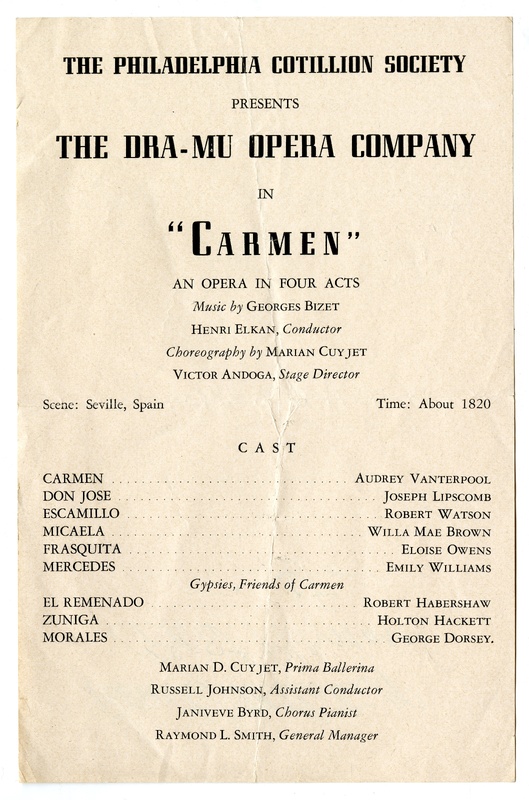-
Title
-
The Philadelphia Cotillion Society presents The Dra-Mu Opera Company in "Carmen"
-
Rights
-
This material is subject to copyright law and is made available for private study, scholarship, and research purposes only. For access to the original or a high resolution reproduction, and for permission to publish, please contact Temple University Libraries, the Charles L. Blockson Afro-American Collection (blockson@temple.edu; 215-204-6632).
-
Description
-
The Dra-Mu Opera Company, "Dra-Mu", was a significant Black opera company in Philadelphia, active during the mid-20th century. Co-founded by Raymond L. Smith and Henri Elkan (Van Atta 1980), the company provided a platform for Black artists to perform operatic works at a time when opportunities in mainstream opera were limited due to racial discrimination.
-
Notably in 1950, the Dra-Mu performed the opera OUANGA by Clarence Cameron White at the Academy of Music in Philadelphia (The African American Composers and Performers of Art Song: The19th and 20th Century, n.d.). This performance was significant as OUANGA is a tragic opera based on the story of Jean-Jacques Dessalines, a leader of the Haitian Revolution. Clarence Cameron White's papers are housed at the Schomburg Center for Research in Black Culture in NYC. The staging by the Dra-Mu highlighted the organization's commitment to presenting works that resonated with Black history and culture. The undated program of CARMEN may have been its debut presentation or a subsequent one. Nevertheless, here is detailed information on the performing artists.
Eloise Owens Strothers (1920–1991), a Black soprano celebrated for her powerful voice and commanding stage presence, made her operatic debut as Frasquita in Carmen with Dra-Mu in 1951 (Eloise Owens Strothers Papers, n.d.). Known as the “Grand Songbird of Philadelphia,” her career spanned more than two decades and included a noted solo recital at the Temple of Divine Love in May 1967 (Philadelphia Inquirer, 1967). Beyond music, Owens Strothers worked for the City of Philadelphia for over 30 years, retiring in 1985. She was active in numerous civil rights and educational organizations and was appointed to the Mayor’s Commission on Women by Mayors William Green and Wilson Goode (Eloise Owens Strothers Papers, n.d.).
Henri Elkan (d. 1980) - A Belgian, was the Dra-Mu's conductor (Philadelphia Inquirer 1955). He came to the states to play viola with the Philadelphia Orchestra, left to conduct the Philadelphia Ballet Company as well as guest maestro in various symphonies throughout the United States (Philadelphia Inquirer 1957). Mr. Elkan also conducted performances such as Gounod's Faust in English at Drexel University, showcasing the company's commitment to bringing classical operatic works to diverse audiences.
Audrey Vanterpool - A distinguished Black soprano who made significant contributions to both Broadway and opera. She was part of the original cast of Carmen Jones, a 1943 adaptation of Bizet’s Carmen featuring an all-Black cast, where she performed in the ensemble. She later took on the role of Hannah in "Livin’ the Life", which opened on Broadway in 1957 (Playbill 2022). Vanterpool performed with the Dra-Mu by portraying the title role in Carmen Jones, earning acclaim for her vibrant voice and stage presence. A winner of the Arthur Godfrey Talent Scouts Award, she also played the role of Mercedes in the Broadway production of the opera in Atlanta (Woolcock 1953).
Willa Mae Brown “Norris” (1924 - 2012) - A soprano who performed with the Dra-Mu, the Philadelphia Concert Orchestra and the 52nd Street Choirs at the African Episcopal Church of St. Thomas in West Philadelphia. She studied opera under Henry Ambler Winder and showcased her talent on local radio and at venues like the Latin Club. Behind the scenes, Ms. Brown was a career elementary teacher in the School District of Philadelphia (Clark 2012).
Marion Cuyjet (1920 – 1996) - A pioneering choreographer, educator, and visionary who transformed American dance by creating formal training opportunities for Black ballet dancers. As founder of Philadelphia’s Judimar School of Dance, she trained generations of dancers, including Judith Jamison, who was artistic director of the Alvin Ailey American Dance Theater (Beck 1976).
Known for high standards and deep belief in her students, Cuyjet also navigated racial barriers—renting studio space as a light-skinned woman to secure access for Black students. As Jamison recalled, “She looked Caucasian and rented studio space that landlords would not rent to a Black person” (New York Times 1996). Cuyjet's influence went beyond technique and rigor; she used dance to model lessons in equity and representation. Her work included the Philadelphia Cotillion Society’s 13th Annual Christmas Extravaganza, where she choreographed the ballet entitled "Imperial Year" (New Pittsburgh Courier 1962).
The Philadelphia Cotillion Society was a Black organization that played a significant role in the city's cultural and social landscape. It provided a platform for young Black women to be formally introduced to society, celebrating their achievements and fostering community pride. It also sponsored cultural events, like Dra-Mu. There was a special Christmas Cotillion held at the New York Hilton on January 3, 1964 in which celebrities and elites such as Marian Anderson, Joan Crawford, Alfred Vanderbilt, Pearl Buck and A. Philip Randolph were contributing sponsors (New York Times 1964).
In the image, the program statement “The Philadelphia Cotillion Society presents The Dra-Mu Opera Company in Carmen” reflects a remarkable achievement of Black cultural convergence. This was a union of civic celebration, artistic excellence, and community pride, all centered on the performance of Bizet’s Carmen—a work that, when staged by Black artists, took on new layers of meaning.
-
Subject
-
Black people
-
Operas
-
Conductors (music)
-
Concert programs
-
Performance artists


